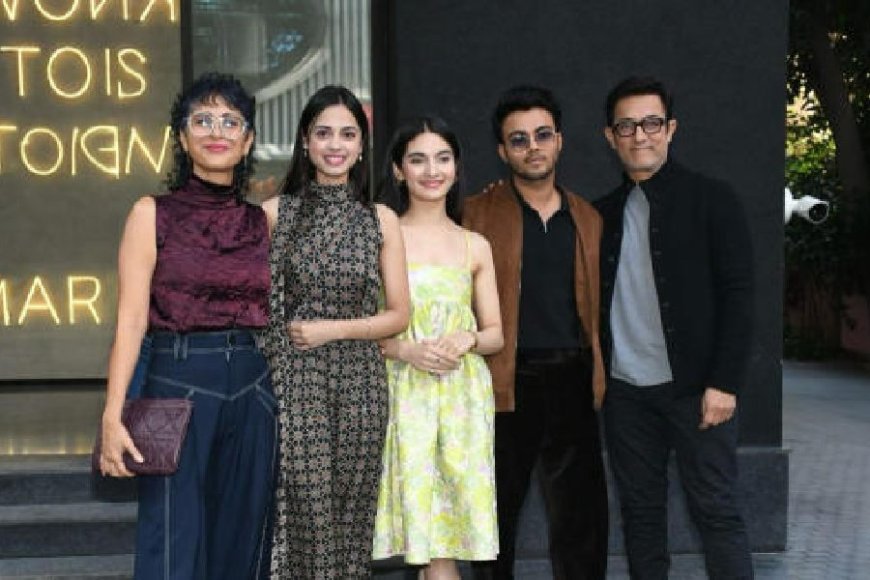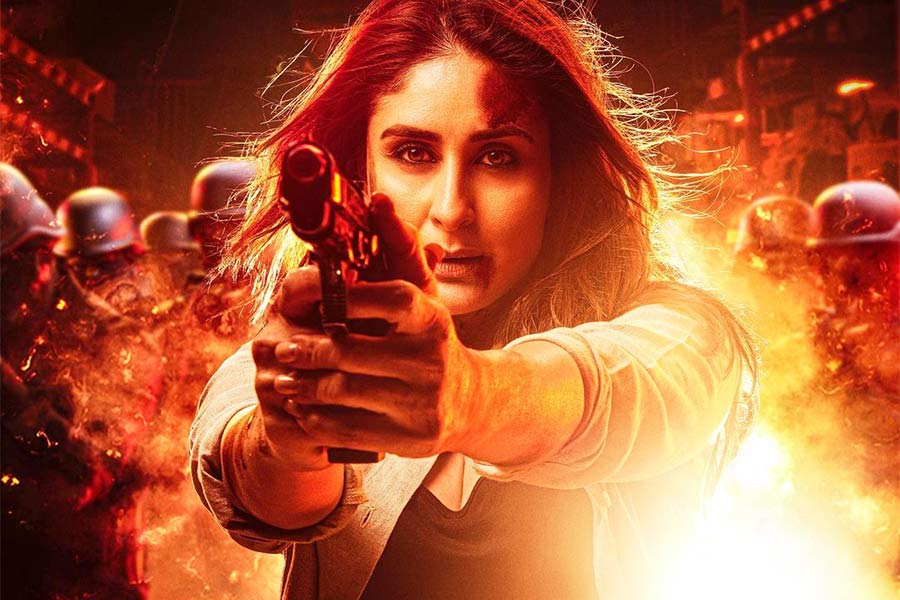Kiran Rao Returns to Directing with "Laapataa Ladies": A Conversation on Comedy, Challenges, and Change
Director discusses pre-release screenings, anxieties, and the film's message of hope

Kiran Rao returned to directing with her Friday film Laapataa Ladies, co-produced by Aamir Khan. The slice-of-life comedy takes a harsh look at patriarchy but softens it through the prism of humor, fourteen years after her first film Dhobi Ghat. A discussion with Kiran on Telegraph.
You chose a unique marketing approach for Laapataa Ladies, releasing it far in advance of the movie's debut to audiences all throughout the nation. What have you been told by others?
The responses have been comforting and kind. Sharing the movie and receiving this type of guarantee in advance has been amazing. The comment that the movie "felt like a warm hug" was the nicest one I've ever received. As a director, it is a great compliment to evoke that type of feeling. We now have optimism thanks to the screenings, and that's the greatest assurance there is when you hear people applaud, laugh, and say kind things about you after the movie.
Did you have any concerns about releasing your movie to such a large audience prior to its premiere?
To be honest, Aamir (Khan, co-producer) came up with the concept. He has a lot of faith in the movie. Like every filmmaker, I was plagued by neuroses and anxieties up to the very last minute, when I thought I could make the movie better (laughs).
The picture was well received by the crowd at TIFF (Toronto International picture Festival), which gave us a lot of confidence. That gave me comfort. It's been nerve-wracking, however.
The purpose of Laapataa Ladies is to entertain viewers. It's a humorous piece. Unless there's a strange person out there who despises feel-good movies, it will become a favorite among viewers. It's doubtful that you will detest the movie, even if you may not enjoy it. I'm glad we had these screenings as word-of-mouth advertising is the best kind of PR. I believe Aamir has a brilliant idea.
Over ten years have passed since your first feature, Dhobi Ghat. Are you starting to become nervous as the release date draws near?
Indeed! In the last 14 years, a lot has changed in the globe. There are a plethora of reasons why Friday night moviegoers choose not to go to the movies. When word spreads when the movie opens in theaters on March 1, I'm hoping that viewers will show up and, ideally, like it enough to encourage others to watch it as well. I am so nervous! (laughs)
I have a lot of extra energy and am often described as a livewire by those who know me well. Now that is even more as a result of all the anxiety!
Did the narrative seem like a warm embrace when you first heard it?
I read Biplab Goswami's tale, and I really enjoyed it! It had most of the topics we intended to cover in the movie and was basically the scenario we have today. It felt more like a warm embrace than anything else, since I had been looking for a tale to direct for the last seven or eight years. I knew right away in 2018 that this was going to be my next movie when I heard it.
We continued to work on it, turning it from its initial dramatic form to something a little more comedic. We enhanced it with additional personality and feeling. But what Biplab had written remains the central theme of the movie. The script, which went under the name "Two Brides," was entered in a competition in which Aamir served as a jury member and took home the second place.
Was Laapataa Ladies the name you always wanted to give it?
Though we thought "Two Brides" should have been in Hindi, we still appreciated it. Many thoughts were shared in a WhatsApp group with the film's participants. From "Ghoonghat ki aad mein" to "Ghoonghat" to "Do Dulhan," we attempted every variation of "Two Brides." At last, Tanaji Dasgupta, our producer, created Laapataa Ladies. As soon as we heard about it, everyone said, "Register it immediately!" Given how much it revealed about the movie, it seemed right out of the blue.
You used actual places for your shots. That must have presented a plethora of difficulties...
Organizing the train shoot was really difficult since, as you said, we filmed in real-world settings. at addition, 200 extras were used for filming at busy train stations at the start of Omicron. It has been among the most difficult things I have had to cope with. During the production, a lot of individuals contracted Covid, so I had to replace a number of people—including several major actors—overnight.
Being back on set, shouting "action" and "cut," and directing was unsettling for me. But such doubts were dispelled very fast. Like riding a bike, even if you haven't done it in a while, you still know how to do it.
I'd completed enough training, casting calls, and acting practices. Scenes were storyboarded. However, nothing can really prepare you for the scene on set when all eyes are on you and they're depending on you to make the decision. However, I came to realize how much I like it and how competent I am (laughs).
Sparsh Shrivastava, Nitanshi Goel, and Pratibha Ranta, your three protagonists, are such naturals that it seems like they were nurtured in that environment from birth.
They are excellent! Their acting experiences range from web series and television to social media. Before we cast her, Nitanshi had two million Instagram followers!
I had a gut feeling about the pitch at which I wanted their performances to be. This kind of scenario may easily go into melodrama or comedy, but I was going for a certain performing style. It required readings, impromptu conversations, and specialized work with select performers on accent and character development to do that. It became considerably simpler on set as a result.
Pitch, timing, and tone all matter in comedy. On set, I wanted them to feel at ease enough to unleash that magic. We were able to elevate the performances because to Jabeen Merchant's astute editing and the performers' outstanding work.
Was comedy the path you were always meant to take?
Indeed. Because of its weighty subject, I thought the original piece would have benefited from humor. This seems like a tale of happiness, optimism, and hope. Rather than just being realistic, I wanted the tone to go somewhat in that direction.
Comedy makes us all laugh. It lowers our intellectual boundaries and creates room for dialogue. A good laugh unites us. I believed that humor would help the audience accept certain thoughts and relate to some topics rather than being overt.
Humor is a powerful magic tool that can turn difficult-to-swallow things. One 1997 film that serves as an example is Life is Beautiful, which tempers one of humanity's harshest experiences—World War II—with warmth and empathy while evoking both laughter and tears. It's a great thing to accomplish with a tale.
Even though there are many more women working on sets these days, is a female director still seen as unusual?
Not in the realm of over-the-top content or the Hindi film business, I believe. As directors, we are really finding far more room than women in other sectors, such as writing, cinematography, or production, where I believe there should be a greater presence of women.
It is no longer difficult for people to follow orders from a woman, unlike even ten or fifteen years ago. Even if you are the first AD (assistant director), I have been in bro gangs where you do feel a bit scared to make decisions. However, a lot has changed in that landscape. Though there is still much work to be done, we are no longer an exception.
Do you find fault with your work?
I have harsh criticisms for my work. I have a hard time letting go. But despite what I formerly saw as their shortcomings, I have grown to adore the majority of Laapataa Ladies. It now resembles a kid whose imperfections you grow to appreciate. However, I am really harsh with myself. I haven't been able to create a film in 12–13 years, so that's probably why.
During your early years, you attended Loreto House and La Martiniere for Girls in Calcutta. How has your upbringing in this city shaped and impacted who you are?
Growing up, Calcutta had a profound effect on me. My family is middle class, therefore when I was a child we didn't have a lot of clothing or toys. However, it was a city that cherished ideas and the intellect. Sports, theater, music, and literature were always available to me. I thus lost much of an understanding of money and whether or not being affluent was desired. It wasn't intended for me.
Growing up in Calcutta shaped me into a very different person than I would have been in any other place. I'm thankful I had the opportunity to grow up in the city because I adore it.





















































